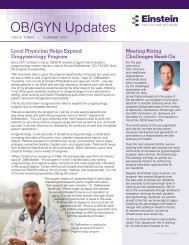Create successful ePaper yourself
Turn your PDF publications into a flip-book with our unique Google optimized e-Paper software.
<strong>Internal</strong> <strong>Medicine</strong><br />
ISSUE FOUR | SUMMER <strong>2021</strong><br />
NEWS<br />
Trial by Fire – New Curriculum<br />
Improves Patient Access<br />
When H. David Hares, MD, MBA, Vice Chairman of the Department of <strong>Medicine</strong>,<br />
began developing a telemedicine curriculum for residents in January 2020,<br />
he had no idea how timely his work would be. Only two months later, as the<br />
COVID-19 pandemic overwhelmed Greater Philadelphia, the new curriculum was<br />
put into practice literally overnight.<br />
“When <strong>Einstein</strong>’s Community Practice Center closed, we went from in-person to<br />
telemedicine visits in the span of a day,” says Dr. Hares, who had completed<br />
the curriculum by that point. “In that first week of late March 2020, the process<br />
changed daily as we determined what did and didn’t work.”<br />
For example, Zoom was the residents’ preferred platform for telemedicine<br />
consultations, but logging in was cumbersome for many patients, Dr. Hares says.<br />
A switch was made to Doximity, which was more straightforward. All patients<br />
needed to do was click a provided link at the appointed time and they were<br />
immediately connected to a physician.<br />
That was a relatively easy fix. On the more complex end of the spectrum was<br />
getting patients checked in and out and supplying them with the necessary<br />
materials after their appointments. “We must have gone through 50 different<br />
iterations of the workflow.” Dr. Hares says. “This would not have happened<br />
without the front desk staff. I think they learned as much as the residents within<br />
the first few weeks.”<br />
The Department of <strong>Medicine</strong>’s prompt and complete support, he says, was also<br />
essential to clearing those early hurdles.<br />
The residents were divided into two teams. One was asked to remain at home<br />
while the other was assigned to the Community Practice Center. The move was<br />
made with their protection foremost in mind, Dr. Hares says, but it also allowed<br />
them to accomplish more through their online consultations, including contacting<br />
high-risk patients to ask if they needed medication refills or food and following up<br />
with patients who had COVID-19 or who were exposed to someone who did.<br />
“It really opened a new way of<br />
approaching our patients and getting<br />
close to them,” Dr. Hares says.<br />
Mondays – didactic day – were<br />
used to discuss in-depth specific<br />
aspects of the new curriculum,<br />
such as how to ask patients to<br />
help with their own physical exam<br />
and how to assess a patient’s<br />
condition based on the structure of<br />
their sentences.<br />
“We taught the residents to<br />
document their limitations, but we<br />
continued on page 2<br />
Dr. Hares helped create a new<br />
way for residents to learn—when<br />
they needed it most.<br />
A Time for Reflection<br />
and Optimism<br />
June is always a<br />
wonderful time<br />
of year for our<br />
program. Not only<br />
are we honoring<br />
the successes<br />
of our outgoing<br />
residents, we’re<br />
welcoming those<br />
who are joining<br />
our program this<br />
summer. What makes <strong>2021</strong> even more<br />
celebratory is the progress made in<br />
battling the COVID-19 pandemic and<br />
the hope the vaccine has brought to<br />
the fight.<br />
It’s been a remarkable year. We’ve<br />
adapted and learned so much about<br />
ourselves and our program. We’ve<br />
also accomplished a great deal. One<br />
example is the use of a virtual platform<br />
to interview and recruit every member<br />
of our incoming class of residents.<br />
This was a first and has opened many<br />
possibilities for future recruitment.<br />
Our program’s recent growth allows<br />
us to improve our curricular offerings<br />
while ensuring resident wellness. This<br />
has helped us attract 30 categorical<br />
residents and 19 preliminary residents<br />
for our incoming class in July.<br />
Keeping our residents safe throughout<br />
the pandemic has been a priority.<br />
We were proud to offer COVID-19<br />
vaccinations to all our residents in<br />
December 2020. We also had the<br />
opportunity to connect with one another<br />
in new ways. Through Zoom and other<br />
virtual platforms we were able to bring<br />
alumni into the “classroom” to present<br />
Grand Rounds. We’ll be exploring more<br />
opportunities for virtual learning with our<br />
alumni in upcoming months.<br />
Finally, as many of you have heard,<br />
<strong>Einstein</strong> Healthcare Network is merging<br />
with Jefferson Health. We are excited<br />
about this next chapter and the<br />
continued on page 2
continued from page 1<br />
Trial by Fire – New Curriculum<br />
Improves Patient Access<br />
also wanted them to be aware there was<br />
much more information available to them by<br />
simply being resourceful,” Dr. Hares says.<br />
The curriculum is designed around four<br />
standards: phone call and video etiquette,<br />
how to provide a physical exam over the<br />
phone or through video, how to involve<br />
a surrogate to help gather information,<br />
and how to document a telemedicine<br />
consultation.<br />
Its impetus was improving patient access.<br />
Ultimately, it proved to be an effective<br />
means of accomplishing that.<br />
“Before the pandemic, we had a no-show<br />
rate at the Community Practice Center of<br />
30% to 40%,” Dr. Hares says. “At the peak<br />
of the pandemic, it was close to 10%.”<br />
continued from page 1<br />
A Time for Reflection and Optimism<br />
opportunities it will present our residency program.<br />
On behalf of our entire program, I would like to offer a heartfelt<br />
congratulations to our graduating residents. We wish you the<br />
best in your future fellowships and careers and ask you to<br />
stay in touch. You’ll always be welcomed as a member of our<br />
<strong>Einstein</strong> family.<br />
Warmly,<br />
Glenn Eiger, MD<br />
Program Director, <strong>Internal</strong> <strong>Medicine</strong> | <strong>Einstein</strong> Medical Center<br />
Philadelphia<br />
215-456-4940 | eigerg@einstein.edu<br />
Editor’s Note: Graduating residents can stay in touch by registering<br />
with <strong>Einstein</strong> Alumni Connect — <strong>Einstein</strong>’s new alumni networking tool.<br />
Visit the site at alumni.einstein.edu.<br />
New Chairman Envisions a More Prominent<br />
Role for the Department<br />
While Victor J. Navarro, MD, was<br />
appointed the Paul J. Johnson Chair<br />
of the Department of <strong>Medicine</strong> in the<br />
middle of a pandemic, his vision for the<br />
coming months and years is undaunted<br />
by recent history.<br />
“I want the department to be on<br />
a growth trajectory for its clinical,<br />
academic, and educational programs,”<br />
he says.<br />
Specifically, Dr. Navarro plans to<br />
expand the department’s offerings for<br />
its most vulnerable patients, including<br />
the geriatric and disabled populations<br />
and those served by the Community<br />
Practice Center, in keeping with <strong>Einstein</strong><br />
Healthcare Network’s mission.<br />
“At the same time, we need to grow<br />
the programs that attract patients from<br />
across the tristate area – transplant<br />
care, cardiac care, and advanced<br />
pulmonary procedures,” he says, “as<br />
well as our treatment of other diseases<br />
that draw patients from beyond the<br />
local region, including rheumatological,<br />
autoimmune, and gastroenterology.”<br />
Dr. Navarro continues to be an active<br />
clinician and endoscopist, overseeing<br />
<strong>Einstein</strong>’s Center for Advanced Liver<br />
Disease and Transplantation, the only<br />
specialty unit of its kind in Philadelphia.<br />
2 | <strong>Summer</strong> <strong>2021</strong> | <strong>Internal</strong> <strong>Medicine</strong> News<br />
He’s also the principal investigator<br />
for the largest research grant ever<br />
awarded to <strong>Einstein</strong>: a study of<br />
palliative care in patients with endstage<br />
liver disease funded by the<br />
Patient Centered Outcomes Research<br />
Institute. Dr. Navarro says he plans<br />
to use some of that momentum<br />
to encourage more clinical and<br />
investigator-initiated trials.<br />
He’s also determined to collaborate<br />
with other academic institutions across<br />
the region. He cited one study being<br />
conducted with LaSalle University<br />
exploring vaccine hesitancy and<br />
vaccine acceptance in minority and<br />
mental health populations.<br />
In the coming academic year, the<br />
department will add fellowships in<br />
geriatrics and palliative care. “We’re<br />
also expanding our internal medicine<br />
residency program,” says Dr. Navarro,<br />
who serves as the program director<br />
for <strong>Einstein</strong>’s Gastroenterology and<br />
Hepatology Fellowship Program. He<br />
started the Transplant Hepatology<br />
Program at <strong>Einstein</strong>. “I want to focus<br />
more effort on community physician<br />
education through our outreach<br />
with gastroenterology and liver,<br />
pulmonary, and rheumatological<br />
diseases.”<br />
Dr. Navarro is the Paul J. Johnson Chair<br />
of the Department of <strong>Medicine</strong>.<br />
For much of the above, Dr. Navarro<br />
sees alumni playing a critical role,<br />
from mentoring the department’s<br />
researchers, or even collaborating<br />
with them, to financially supporting its<br />
visa sponsorships, which he wants to<br />
continue aggressively pursuing.<br />
“The most important reason I took this<br />
position is because of the quality of the<br />
physicians who work here,” Dr. Navarro<br />
says. “Second, we attract some of the<br />
brightest minds from around the world.<br />
Finally, <strong>Einstein</strong> is an environment that<br />
stresses inclusion, innovation, and<br />
creativity, which sometimes requires<br />
courage to think outside the box.”
The Resident Who<br />
Forgot to Sleep<br />
Here in Philadelphia, Jerald Pelayo, MD, is<br />
making the most of the second year of his<br />
internal medicine residency. He’s developing<br />
a reputation in the department as a smart,<br />
hard-working doctor with an impossibly<br />
upbeat attitude. But as the father of a<br />
newborn, the days are beginning to blend.<br />
Back in his native Philippines, however,<br />
Dr. Pelayo is sort of a celebrity. In 2011, he<br />
earned the top score in the country on the<br />
nursing board exam. Seven years later, he<br />
pulled off the same feat on the physician<br />
licensure exam. Over the three years since,<br />
he’s become a highly sought-after speaker in<br />
the Philippines.<br />
Which is to say that, when he returns home<br />
after a long shift, his day is far from done.<br />
Frequently, there’s a speaking engagement<br />
on Zoom he’ll turn to next. And that’s only<br />
the beginning. Dr. Pelayo is also a layman<br />
preacher and a prolific pianist, singer, and<br />
composer.<br />
“It makes life more interesting,” he says of all<br />
his interests. “I’m very efficient with my time,<br />
and I do have my priorities, my family and<br />
residency. Right now, I’m trying to see if I can<br />
handle it all.”<br />
Dr. Pelayo’s wife, a licensed nurse and<br />
physician, though she hasn’t yet completed<br />
her USMLE, is trying to get him to understand<br />
he doesn’t need to be so busy all the time.<br />
At the heart of Dr. Pelayo’s activity is his<br />
residency. He’s discovered a nurturing<br />
environment at <strong>Einstein</strong>, where his<br />
relationships with his mentors have<br />
been the highlight.<br />
Dr. Pelayo was drawn to internal medicine<br />
because he, “likes thinking about a person’s<br />
whole being, the interplay of all the systems.”<br />
He’s leaning toward specializing in transplant<br />
nephrology — a specialty, Dr. Pelayo says,<br />
that is few and far between in the Philippines.<br />
“And I’ve always liked the complexity of<br />
kidney physiology.”<br />
He admits the decision<br />
is not his alone to<br />
make. His wife will<br />
begin her residency<br />
soon. And, as<br />
always, there are a<br />
lot of other moving<br />
parts to his life.<br />
Dr. Pelayo knows<br />
how to make<br />
the most of his<br />
time.<br />
Determined to Find the Truth Amid<br />
Urgency and Uncertainty<br />
Kevin Bryan Lo, MD, describes the early<br />
days of the COVID-19 pandemic as<br />
moments of desperation.<br />
There was little consensus about how<br />
COVID patients should be treated, says<br />
Dr. Lo, who worked on the front lines as a<br />
chief resident.<br />
Amid such urgency and uncertainty,<br />
every bit of new information felt like the<br />
discovery of another piece of a puzzle,<br />
Dr. Lo explains — even though no one had<br />
any idea what the puzzle ultimately would<br />
look like. This lack of context was what<br />
unnerved him most.<br />
“We didn’t know how any of those outside<br />
findings applied to our own patients, many<br />
of whom suffer from multiple comorbidities<br />
and who appeared to be at high risk for<br />
contracting COVID,” he says.<br />
Inspired by his<br />
experiences during<br />
COVID-19, Dr. Lo is<br />
embracing research.<br />
Very quickly, Dr. Lo, who is now the Clerkship Site Director for the<br />
Department of <strong>Medicine</strong>, decided he needed to embark on his own<br />
research. “This was a once-in-a-lifetime thing,” he says.<br />
Dr. Lo says he received immediate support from his mentors and<br />
moved ahead, recruiting about 20 others in <strong>Internal</strong> <strong>Medicine</strong> — a mix<br />
of residents and attending physicians — to help him. “It was easy to find<br />
people who wanted to help,” he says. After brainstorming together, he<br />
coordinated what they’d be studying, sought approval from <strong>Einstein</strong>’s<br />
review board, assisted in collecting the data, and helped draft the studies,<br />
the first of which were published within a month of their start.<br />
He says their research focused mostly on what COVID looked like<br />
in <strong>Einstein</strong>’s patient population and its impact on the different organ<br />
systems, such as the blood, liver, and kidneys. Their findings regarding<br />
the use of blood thinners were the most significant deviation from what<br />
was known at the time. A higher rate of blood clots was observed among<br />
patients with COVID early in the pandemic. While most of the evidence<br />
was only anecdotal, the urgency of the moment was compelling many<br />
doctors to start giving more blood thinners, Dr. Lo says.<br />
“But this could also make some people more prone to bleeding,” he says.<br />
“So we really needed to determine the best course of action.”<br />
His group’s research found medium to higher doses of blood thinners<br />
were not the best course of action for every patient.<br />
“During the peak of the COVID-19 pandemic, there were no guidelines for<br />
anticoagulation in COVID patients anywhere in the world. We’re supposed<br />
to follow the same guidelines used for treating patients who don’t have<br />
COVID,” Dr. Lo says.<br />
A year later, he says, “we know a lot more now, but there’s still much we<br />
need to learn.”<br />
According to Dr. Lo, his training at <strong>Einstein</strong> has “pushed him to become<br />
a good clinician.” It’s also provided him with the freedom to pursue his<br />
various interests as a researcher. And now, because of this experience,<br />
he’s considering incorporating research into his career.<br />
“Research has such an impact on what we do,” Dr. Lo says. “If this wasn’t<br />
clear already, it became very clear during the pandemic.”<br />
<strong>Internal</strong> <strong>Medicine</strong> News | <strong>Summer</strong> <strong>2021</strong> | 3
<strong>Einstein</strong> Healthcare Network<br />
Office of Development<br />
Braemer Education Building<br />
5501 Old York Road | Philadelphia, PA 19141<br />
Have exciting news to share?<br />
Want to keep up with fellow <strong>Einstein</strong><br />
alumni? Or need to send us your<br />
updated contact information?<br />
Please drop a note to Fran Gress,<br />
Manager of Annual Fund and Alumni<br />
Relations at gressfra@einstein.edu<br />
or call 215-456-6278. Or share your news<br />
at advance.einstein.edu/alumni..<br />
When Residency is Thousands of Miles from Home<br />
Alejandro Delgado, MD, reveled in the camaraderie of his<br />
peers during his internal medicine residency at <strong>Einstein</strong>, but<br />
he didn’t become acutely aware of how precious it was until it<br />
was over.<br />
“Although I appreciated my fellowship experience on a<br />
number of levels, I missed the sense of family I felt during<br />
my residency,” says Dr. Delgado, physician and ethics<br />
consultant in the Division of Infectious Diseases at <strong>Einstein</strong>.<br />
He and Maria Lagarde, MD, gastroenterologist and hepatologist<br />
at <strong>Einstein</strong>, married in 2009. Dr. Delgado began his residency<br />
the next year. Dr. Lagarde started hers, also at <strong>Einstein</strong>, a year<br />
later. They met during an obstetrics and gynecology rotation in<br />
medical school, in their native Venezuela.<br />
While they acknowledge their marriage was a unique<br />
advantage during their residencies – “It was great having<br />
someone who really understood what I was going through,”<br />
Dr. Delgado says – they were still more than 2,000 miles from<br />
their families and friends. Which is why some of their favorite<br />
memories are of holidays spent with fellow residents, many of<br />
whom were also international students.<br />
4 | <strong>Summer</strong> <strong>2021</strong> | <strong>Internal</strong> <strong>Medicine</strong> News<br />
“We called it the ‘United Nations of<br />
<strong>Einstein</strong>,’” Dr. Delgado says.<br />
“The friends we made during residency<br />
remain some of our best friends here in<br />
the United States,” Dr. Lagarde says.<br />
Their families living outside the US,<br />
there was a real sense of community<br />
among us.”<br />
The experience inspired them to<br />
practice at <strong>Einstein</strong> and to help shape<br />
the next generation of residents as<br />
members of the gastroenterology and<br />
infectious diseases faculty. They also<br />
have two young daughters, both born<br />
at <strong>Einstein</strong>.<br />
“I find the way <strong>Einstein</strong> addresses education very<br />
approachable. It’s a tried-and-true system.” says Dr. Lagarde,<br />
who also did her transplant hepatology fellowship at <strong>Einstein</strong>.<br />
“As much as I teach the residents, I also learn from their<br />
experiences. This helps me stay on top of my field. It’s a<br />
rewarding experience.”<br />
Supporting <strong>Einstein</strong> Healthcare Network’s <strong>Internal</strong> <strong>Medicine</strong> Residency Program<br />
Gifts to support <strong>Einstein</strong> Healthcare Network’s <strong>Internal</strong> <strong>Medicine</strong> Residency<br />
Program directly impact the training and well-being of our residents. You<br />
may make your tax-deductible gift in support of the program by donating<br />
online at advance.einstein.edu/alumni or calling 215-456-6278.<br />
Dr. Delgado and<br />
Dr. Lagarde fondly<br />
remember their time<br />
as <strong>Einstein</strong> residents.<br />
Office of Development<br />
Braemer Education Building<br />
5501 Old York Road<br />
Philadelphia, PA 19141


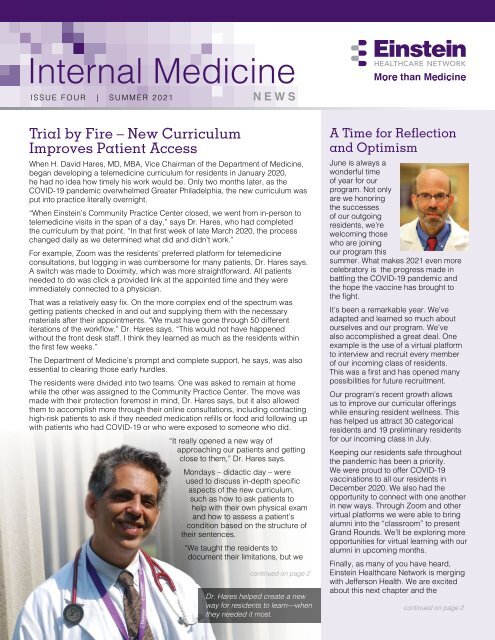
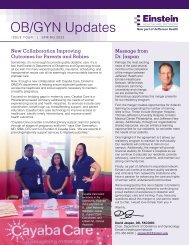
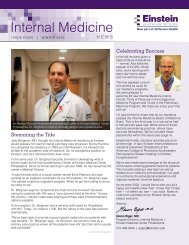
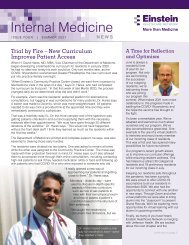
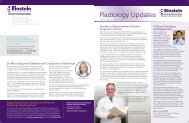

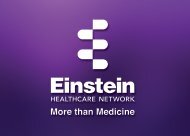
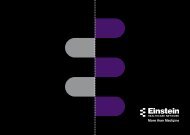
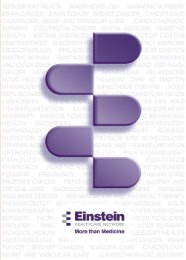
![Donor_Impact_Report_2019[1]](https://img.yumpu.com/65872065/1/186x260/donor-impact-report-20191.jpg?quality=85)



